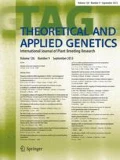Abstract.
Phomopsis stem blight (PSB) caused by Diaporthe toxica is a major disease in narrow-leafed lupin (Lupinus angustifolius L.). The F2 progeny and the parental plants from a cross between a breeding line 75A:258 (containing a single dominant resistance gene Phr1 against the disease) and a commercial cultivar Unicrop (susceptible to the disease) were used for development of molecular markers linked to the disease resistance gene. Two pairs of co-dominant DNA polymorphisms were detected using the microsatellite-anchored fragment length polymorphism (MFLP) technique. Both pairs of polymorphisms were isolated from the MFLP gels, re-amplified by PCR, sequenced, and converted into co-dominant, sequence-specific and PCR-based markers. Linkage analysis by MAPMAKER suggested that one marker (Ph258M2) was 5.7 centiMorgans (cM) from Phr1, and the other marker (Ph258M1) was 2.1 cM from Ph258M2 but further away from Phr1. These markers are suitable for marker-assisted selection (MAS) in lupin breeding.
Similar content being viewed by others
Author information
Authors and Affiliations
Additional information
Electronic Publication
Rights and permissions
About this article
Cite this article
Yang, .H., Shankar, .M., Buirchell, .B. et al. Development of molecular markers using MFLP linked to a gene conferring resistance to Diaporthe toxica in narrow-leafed lupin (Lupinus angustifolius L.). Theor Appl Genet 105, 265–270 (2002). https://doi.org/10.1007/s00122-002-0925-1
Received:
Accepted:
Issue Date:
DOI: https://doi.org/10.1007/s00122-002-0925-1




